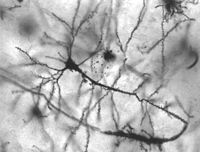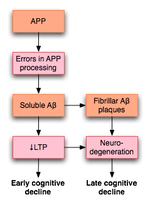- Neurological disorder
-
 Neurons in patient with epilepsy, 40x.
Neurons in patient with epilepsy, 40x.
A neurological disorder is a disorder of the body's nervous system. Structural, biochemical or electrical abnormalities in the brain, spinal cord, or in the nerves leading to or from them, can result in symptoms such as paralysis, muscle weakness, poor coordination, loss of sensation, seizures, confusion, pain and altered levels of consciousness. There are many recognized neurological disorders, some relatively common, but many rare. They may be revealed by neurological examination and studied and treated within the specialities of neurology and clinical neuropsychology. Interventions include preventative measures, lifestyle changes, physiotherapy or other therapy, neurorehabilitation, pain management, medication, or operations performed by neurosurgeons. The World Health Organization estimated in 2006 that neurological disorders and their sequelae affect as many as one billion people worldwide, and identified health inequalities and social stigma/discrimination as major factors contributing to the associated disability and suffering.[1]
Contents
Causes
 Part of the causal chain leading to Alzheimer's disease.
Part of the causal chain leading to Alzheimer's disease.
Although the brain and spinal cord are surrounded by tough membranes, enclosed in the bones of the skull and spinal vertebrae, and chemically isolated by the so-called blood-brain barrier, they are very susceptible if compromised. Peripheral nerves tend to lie deep under the skin but are also still relatively exposed to damage. And individual neurons, the building blocks of the nervous system, and the neural networks into which they form, are susceptible to electrochemical and structural disruption. While neuroregeneration may occur in the peripheral nervous system, it is thought to be rare in the brain and spinal cord.
The specific causes vary by disorder and sometimes by individual case, but can include genetic disorders; congenital abnormalities or disorders; infections; lifestyle or environmental health problems including malnutrition; and brain injury, spinal cord injury or nerve injury. The problem may start in another body system that interacts with the nervous system; for example cerebrovascular disorders involve brain injury due to problems with the blood vessels (cardiovascular system) supplying the brain, and autoimmune disorders involve damage caused by the body's own immune system.
In a substantial minority of cases of neurological symptoms, no neural cause can be identified using current testing procedures, and such "idiopathic" conditions can invite different theories about what is occurring.
Classification
Nervous system 
The Human Nervous System. Neurological disorders can be categorized according to the primary location affected, the primary type of dysfunction involved, or the primary type of cause. The broadest division is between central nervous system (CNS) disorders and peripheral nervous system (PNS) disorders. The Merck Manual lists brain, spinal cord and nerve disorders in the following overlapping categories:[2]
- Brain:
- Brain damage according to cerebral lobe (see also lower brain areas such as basal ganglia, cerebellum, brainstem):
- Frontal lobe damage
- Parietal lobe damage
- Temporal lobe damage
- Occipital lobe damage
- Brain dysfunction according to type:
- Aphasia (language)
- Dysarthria (speech)
- Apraxia (patterns or sequences of movements)
- Agnosia (identifying things/people)
- Amnesia (memory)
- Brain damage according to cerebral lobe (see also lower brain areas such as basal ganglia, cerebellum, brainstem):
- Spinal cord disorders (see spinal pathology, injury, inflammation)
- Peripheral nervous system disorders
- Cranial nerve disorders
- Autonomic nervous system disorders
- Seizure disorders such as epilepsy
- Movement disorders such as Parkinson's disease
- Sleep disorders
- Headaches (including migraine)
- Lower back and neck pain (see Back pain)
- Other pain (see Neuropathic pain)
- Delirium and dementia such as Alzheimer's disease
- Dizziness and vertigo
- Stupor and coma
- Head injury
- Stroke (CVA, cerebrovascular attack)
- Tumors of the nervous system (e.g. cancer)
- Multiple sclerosis (MS) and other demyelinating diseases
- Infections of the brain or spinal cord (including meningitis)
- Prion diseases (a type of infectious agent)
- Complex regional pain syndrome (CRPS) (a chronic pain condition.)
Neurological disorders in non-human animals are treated by veterinarians.[3][4]
Neural and mental dysfunction
Mental disorders, learning disabilities and mental retardation are not usually classed as primarily neurological. However the distinction can be a matter of some debate, either in regard to specific facts about the cause of a condition or in regard to the general understanding of brain and mind. Furthermore the definition of disorder can be contested in regard to what is considered abnormal, dysfunctional, harmful or unnatural in neurological, evolutionary, psychometric or social terms.
While certain types of mental condition are not usually classified primarily as neurological disorders, and certain types of brain disorder are not usually classified primarily as mental conditions, there are now an array of basic sciences that deal with the continuum between the neural and the mental, including subspecialities of psychology and neuroscience such as neuropsychology, cognitive neuropsychology or cognitive (thought) neuroscience, affective (emotion) neuroscience, behavior neuroscience (also known as biopsychology), social neuroscience, and neurophenomenology (subjective experience and consciousness).
 Different levels of analysis in the understanding of cognition in the brain.
Different levels of analysis in the understanding of cognition in the brain.
These basic fields inform the applied medical and clinical disciplines of neurology, psychiatry and clinical psychology, whose theories and treatments now routinely encompass a biopsychosocial model. These disciplines in turn comprise subspecialities such as behavioral neurology, neuropsychiatry and clinical neuropsychology that deal with cases where a connection between mental/behavioral problems and brain dysfunction is particularly called for. Biopsychiatry is the general term for the approach in psychiatry that seeks to explain all mental disorders primarily in terms of the biological functioning of the nervous system.
The conventional distinctions drawn between mind, brain and nervous system are to some extent mirrored by the various overlapping categories of clinical examination, namely mental state examination, neuropsychological assessment and neurological examination. At the present time a brain scan alone cannot accurately diagnose a mental disorder or tell the risk of developing one, but can be used to rule out other medical conditions such as a brain tumor.[5]
Such distinctions can affect the explanation given for idiopathic (of unknown origin) neurological symptoms if it is thought (perhaps by exclusion of any other diagnosis) that higher brain/mental activity is causing symptoms that usually originate in other areas of the nervous system. Classic examples are "functional" seizures, sensory numbness, "functional" limb weakness and functional neurological deficit ("functional" in this context is usually contrasted with the old term "organic disease"). Such cases may be contentiously interpreted as being "psychological" rather than "neurological". In psychiatry some cases may then be classified as mental disorders, for example conversion disorder if the symptoms appear to be causally linked to emotional states or responses to social stress. However there are also accepted neurological conditions of dissociation where the brain/mind appears to register neurological stimuli that cannot possibly be coming from the part of the nervous system to which they would normally be attributed, such as phantom pain or synesthesia, or where limbs act without conscious direction, as in alien hand syndrome.
See also
- Central nervous system
- Central nervous system disease
- Human brain
- ICD-10 Chapter VI: Diseases of the nervous system
- Mental illness
- Neuroplasticity
External links
References
Nervous system (TA A14, GA 9) Central nervous system Peripheral nervous system Categories:- Neurological disorders
- Brain:
Wikimedia Foundation. 2010.

